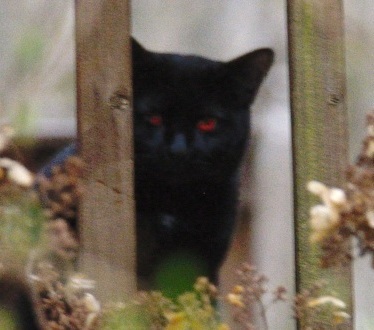 hen a cat purrs, is it really expressing contentment? Maybe the purring cat is
really saying “I am
this human's master and he or she will henceforth obey me, clean my fur, and feed me,
lest I scratch his or her eyes out and vomit partially-digested grass all over his or
her clean carpet!”
hen a cat purrs, is it really expressing contentment? Maybe the purring cat is
really saying “I am
this human's master and he or she will henceforth obey me, clean my fur, and feed me,
lest I scratch his or her eyes out and vomit partially-digested grass all over his or
her clean carpet!”
In fact, cats are divided into two non-overlapping types: roaring cats and purring cats. Cats use the same mechanism to purr that lions use to roar. A purr is the closest your domestic cat can come to roaring like a lion.

Guinea pigs also make a similar rumbling sound, which indicates dominance; male guinea pigs purr, called ‘rumblestrutting,’ when approaching a mate. Rabbits also purr, though it's harder to hear. Most owners think it's because the rabbits are happy, but in fact they are grinding their teeth. Maybe they are secretly wishing they could be done with this obligate herbivore crap and start gnawing on your flesh.
So cats purr for one of three reasons: they own you, they want to do you, or they want to eat you.
Cats also have a symbiotic relationship with toxoplasmosis, a microorganism that takes over the human brain and forces us to buy more cats. Some suspect that the true appearance of cats is too hideous for humans to behold; like the Vorlons on Babylon 5, cats have genetically engineered us to think they are cute.
Well, now finally some scientists are going to get their revenge. Dr John Bradshaw, a feline behavior expert in the UK, evidently fed up with cats dropping dead mice on his bed, was recently quoted by the Telegraph as saying domestic cats could be “genetically engineered to remove their hunting instinct, as modern owners become increasingly horrified by the primitive habit.”
Of course, humans have always genetically altered plants and animals—changing bananas and cows to make tastier banana splits and more nutritious hamburgers.
But now they want to change them even more, not for nutrition, but to impose human values on the animal kingdom. Pigs are to be engineered to make them thinner and more svelte, based on the mistaken idea that eating fat is harmful, and cats are to be modified to remove their hunting instinct.
Don't be fooled into thinking it would stop with the hunting instinct. They'd have to remove the claws and the incisors as well. And those satanic red eyes would have to go too. Cats would be changed into tribbles.
People who have been overprotected in childhood want to live their lives in a safe cocoon—a cartoon world. Then they're shocked when they're gored by a wild bison or when a cute monkey tries to rip their face off. Whether you call it political correctness or something else, it's nature's way of ensuring that those who would deny reality don't have to live in it.
Now genetic technology is allowing us to change reality. I suspect that the real reason is that mutating cats is also a way of getting us used to the idea of mutating humans. Those in power would love to remove human aggression, to make us more passive and easier to control. Whether it's done under the guise of feminism or under the guise of crime control, making humans less aggressive would also make us extinct the first time we encountered a tribe of non-mutated humans.
Think those mutant animals will thank us after we're extinct? With no fat to keep them warm, mutant pigs will freeze to death. With no ability to hunt, cats will starve, even when surrounded by mice. Our mutant cats will spend eternity in Animal Hell cursing the humans whose twisted politics turned them into tribbles, ruing the day that from a sense of misplaced kindness they refrained from making claw marks in our drapes.
